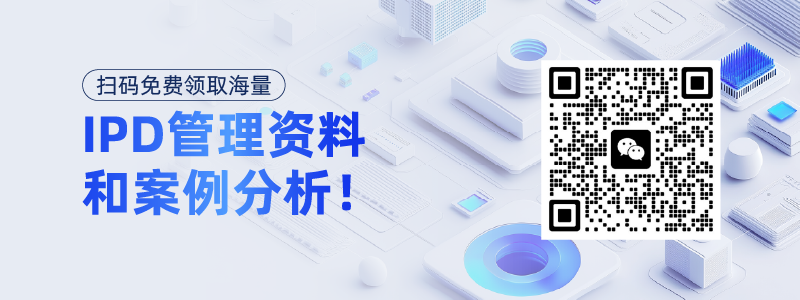ZenTao
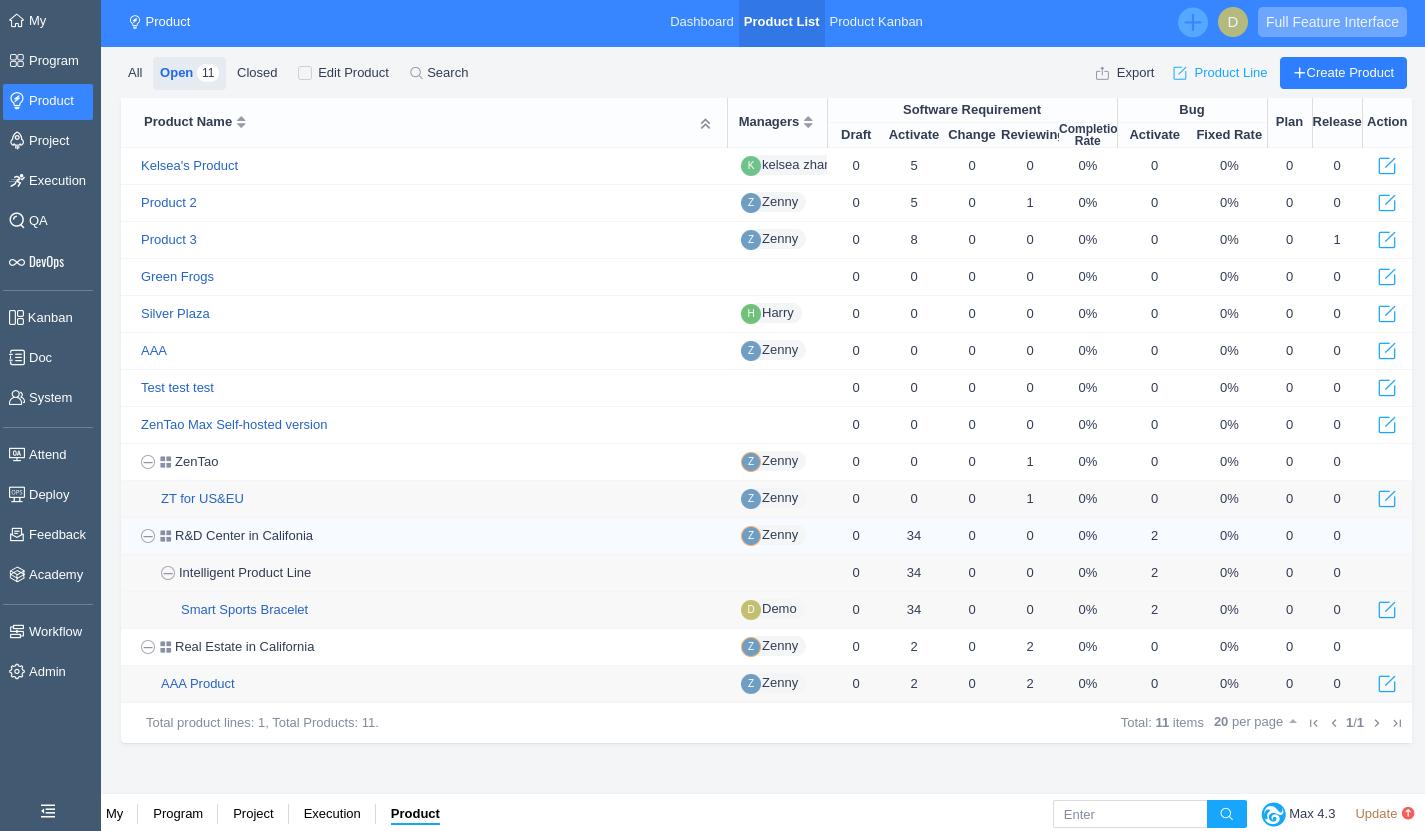
ZenTao is a comprehensive project management software that is particularly popular in the software development industry. It offers a wide range of features, including task management, bug tracking, and product management. One of the standout features of ZenTao is its ability to integrate with other tools, making it a versatile solution for teams that use multiple software platforms. The software's user-friendly interface ensures that team members can quickly adapt to its functionalities, reducing the learning curve.
Another significant advantage of ZenTao is its robust reporting capabilities. Managers can generate detailed reports on project progress, resource allocation, and team performance. This data-driven approach allows for better decision-making and ensures that projects stay on track. Additionally, ZenTao's support for agile methodologies makes it an ideal choice for teams that follow iterative development processes. The software's flexibility and scalability make it suitable for projects of all sizes, from small startups to large enterprises.
ZenTao also places a strong emphasis on collaboration. Its built-in communication tools, such as forums and discussions, facilitate seamless interaction among team members. This collaborative environment fosters innovation and ensures that everyone is on the same page. Overall, ZenTao is a powerful project management tool that combines functionality, ease of use, and collaboration, making it a top choice for organizations in various industries.
Plaky
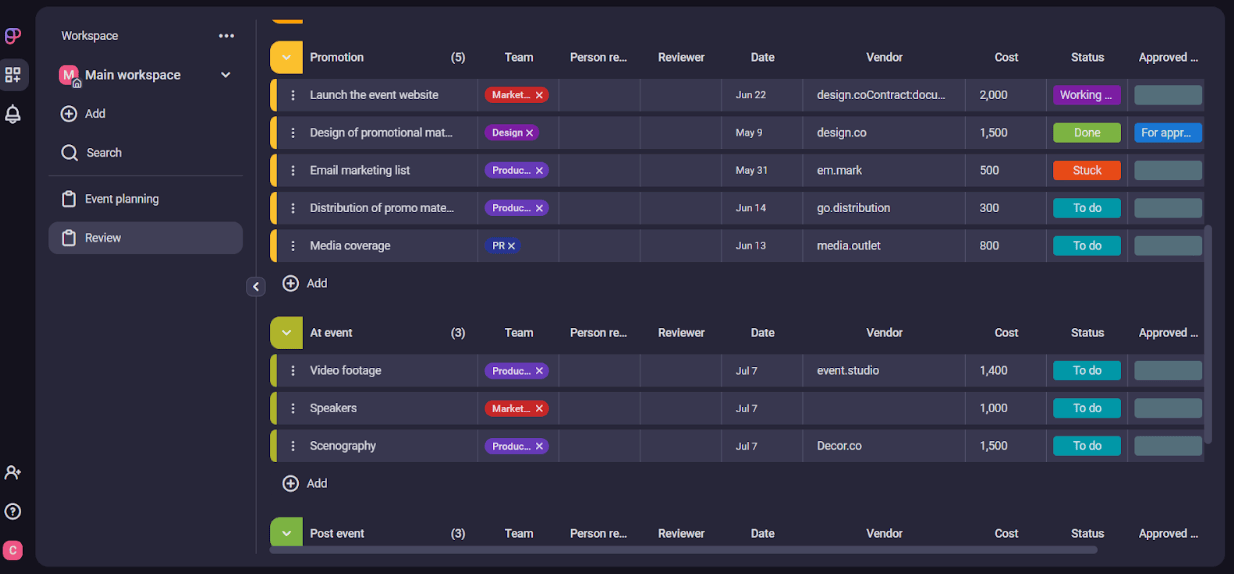
Plaky is a versatile project management tool that is designed to simplify task management and enhance team collaboration. One of the key features of Plaky is its intuitive interface, which allows users to create and manage tasks with ease. The software's drag-and-drop functionality makes it easy to organize tasks into different categories, ensuring that team members can quickly identify their priorities. Plaky also offers customizable workflows, allowing organizations to tailor the software to their specific needs.
Another notable feature of Plaky is its integration capabilities. The software can be integrated with other popular tools, such as Google Drive and Slack, ensuring that teams can work seamlessly across different platforms. This integration capability is particularly useful for organizations that use a variety of software tools to manage their projects. Plaky's ability to sync data across different platforms ensures that team members always have access to the most up-to-date information.
Plaky also offers robust reporting and analytics features. Managers can generate detailed reports on project progress, team performance, and resource utilization. These reports provide valuable insights that can be used to make informed decisions and optimize project workflows. Additionally, Plaky's mobile app allows team members to manage tasks and collaborate on projects from anywhere, making it a convenient solution for remote teams. Overall, Plaky is a powerful project management tool that offers a range of features to enhance productivity and collaboration.
LiquidPlanner
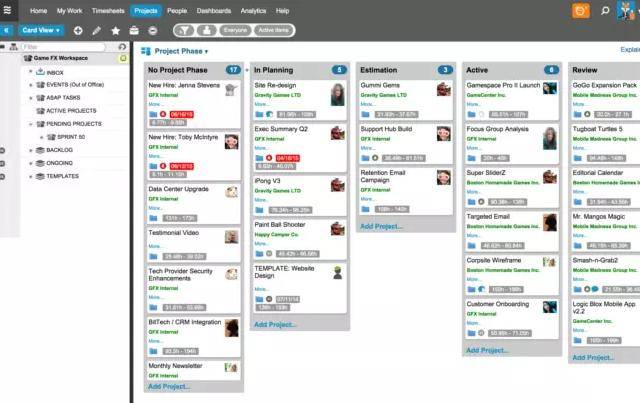
LiquidPlanner is a dynamic project management tool that is designed to help teams manage complex projects with ease. One of the standout features of LiquidPlanner is its predictive scheduling capability. The software uses advanced algorithms to predict project timelines and adjust schedules based on real-time data. This predictive approach ensures that teams can anticipate potential delays and make necessary adjustments to keep projects on track. LiquidPlanner's ability to handle uncertainty makes it an ideal choice for projects with fluctuating timelines and resource requirements.
Another significant advantage of LiquidPlanner is its robust resource management capabilities. The software allows managers to allocate resources efficiently and track their utilization in real-time. This ensures that resources are used optimally and that there are no bottlenecks in the project workflow. LiquidPlanner's resource management features also include capacity planning, which helps managers identify potential resource shortages and address them proactively.
LiquidPlanner also offers comprehensive reporting and analytics features. Managers can generate detailed reports on project progress, resource allocation, and team performance. These reports provide valuable insights that can be used to make informed decisions and optimize project workflows. Additionally, LiquidPlanner's collaboration tools, such as comments and notifications, ensure that team members are always informed and can work together effectively. Overall, LiquidPlanner is a powerful project management tool that offers a range of features to manage complex projects and optimize resource utilization.
Plutio
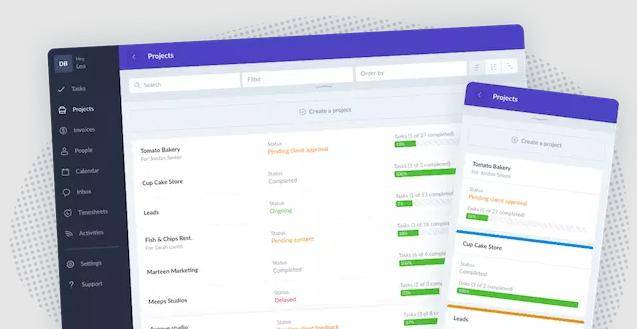
Plutio is a comprehensive project management tool that is designed to streamline workflows and enhance collaboration. One of the key features of Plutio is its all-in-one functionality. The software combines project management, invoicing, and client management into a single platform, making it a convenient solution for freelancers and small businesses. Plutio's user-friendly interface allows users to manage tasks, track time, and create invoices with ease. The software's integration capabilities, such as with PayPal and Stripe, ensure that financial transactions are handled smoothly.
Another notable feature of Plutio is its customizable workflows. The software allows users to create custom workflows that align with their specific business processes. This flexibility ensures that organizations can tailor the software to their unique needs, enhancing efficiency and productivity. Plutio's ability to automate repetitive tasks, such as invoicing and follow-ups, saves time and reduces the risk of human error.
Plutio also offers robust reporting and analytics features. Users can generate detailed reports on project progress, time tracking, and financial performance. These reports provide valuable insights that can be used to make informed decisions and optimize business operations. Additionally, Plutio's collaboration tools, such as comments and file sharing, ensure that team members can work together effectively. Overall, Plutio is a powerful project management tool that offers a range of features to streamline workflows and enhance collaboration.
Planview
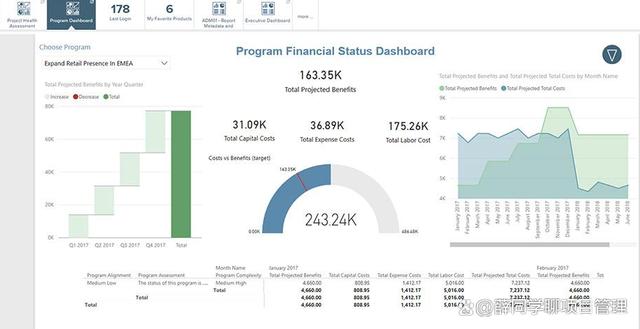
Planview is a comprehensive project and portfolio management software that is designed to help organizations manage their resources and optimize their project portfolios. One of the key features of Planview is its robust portfolio management capabilities. The software allows managers to prioritize projects based on strategic objectives, allocate resources efficiently, and track project performance in real-time. Planview's portfolio management features ensure that organizations can align their projects with their business goals and make data-driven decisions.
Another significant advantage of Planview is its advanced analytics and reporting capabilities. The software provides detailed insights into project performance, resource utilization, and financial metrics. These insights enable managers to identify potential risks and opportunities, and make informed decisions to optimize project outcomes. Planview's ability to integrate with other tools, such as Microsoft Project and JIRA, ensures that organizations can work seamlessly across different platforms.
Planview also offers robust collaboration tools, such as task management, document sharing, and communication features. These tools ensure that team members can work together effectively and stay informed about project progress. Additionally, Planview's mobile app allows users to manage projects and collaborate on tasks from anywhere, making it a convenient solution for remote teams. Overall, Planview is a powerful project and portfolio management tool that offers a range of features to optimize resource utilization and enhance collaboration.
Kantata
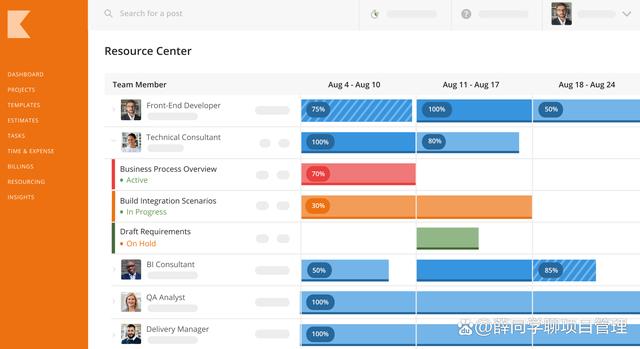
Kantata is a specialized project management software that is designed for professional services firms. One of the key features of Kantata is its robust time and expense tracking capabilities. The software allows users to track time spent on projects, manage expenses, and generate detailed reports on financial performance. Kantata's time tracking features ensure that organizations can bill clients accurately and optimize resource utilization.
Another notable feature of Kantata is its advanced resource management capabilities. The software allows managers to allocate resources efficiently, track their utilization, and identify potential resource shortages. Kantata's resource management features include capacity planning, which helps managers anticipate resource needs and make necessary adjustments to ensure project success. Additionally, Kantata's integration capabilities, such as with QuickBooks and Salesforce, ensure that organizations can work seamlessly across different platforms.
Kantata also offers comprehensive reporting and analytics features. Managers can generate detailed reports on project performance, resource allocation, and financial metrics. These reports provide valuable insights that can be used to make informed decisions and optimize business operations. Additionally, Kantata's collaboration tools, such as task management and communication features, ensure that team members can work together effectively. Overall, Kantata is a powerful project management tool that offers a range of features to optimize resource utilization and enhance collaboration in professional services firms.
Filestage
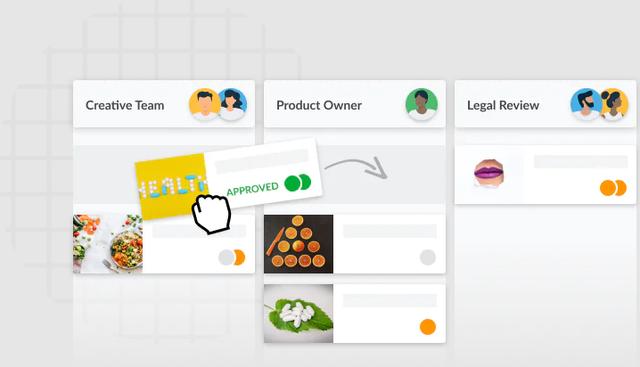
Filestage is a specialized project management software that is designed for content review and approval workflows. One of the key features of Filestage is its robust content review capabilities. The software allows users to upload content, invite reviewers, and track feedback in real-time. Filestage's review and approval features ensure that content is reviewed and approved efficiently, reducing the time and effort required to finalize projects.
Another notable feature of Filestage is its integration capabilities. The software can be integrated with other popular tools, such as Slack and Dropbox, ensuring that teams can work seamlessly across different platforms. Filestage's ability to sync data across different platforms ensures that team members always have access to the most up-to-date information. Additionally, Filestage's collaboration tools, such as comments and notifications, ensure that team members can work together effectively.
Filestage also offers comprehensive reporting and analytics features. Managers can generate detailed reports on content review progress, approval timelines, and team performance. These reports provide valuable insights that can be used to make informed decisions and optimize content review workflows. Additionally, Filestage's mobile app allows users to manage content reviews and collaborate on projects from anywhere, making it a convenient solution for remote teams. Overall, Filestage is a powerful project management tool that offers a range of features to streamline content review and approval workflows.
Basecamp
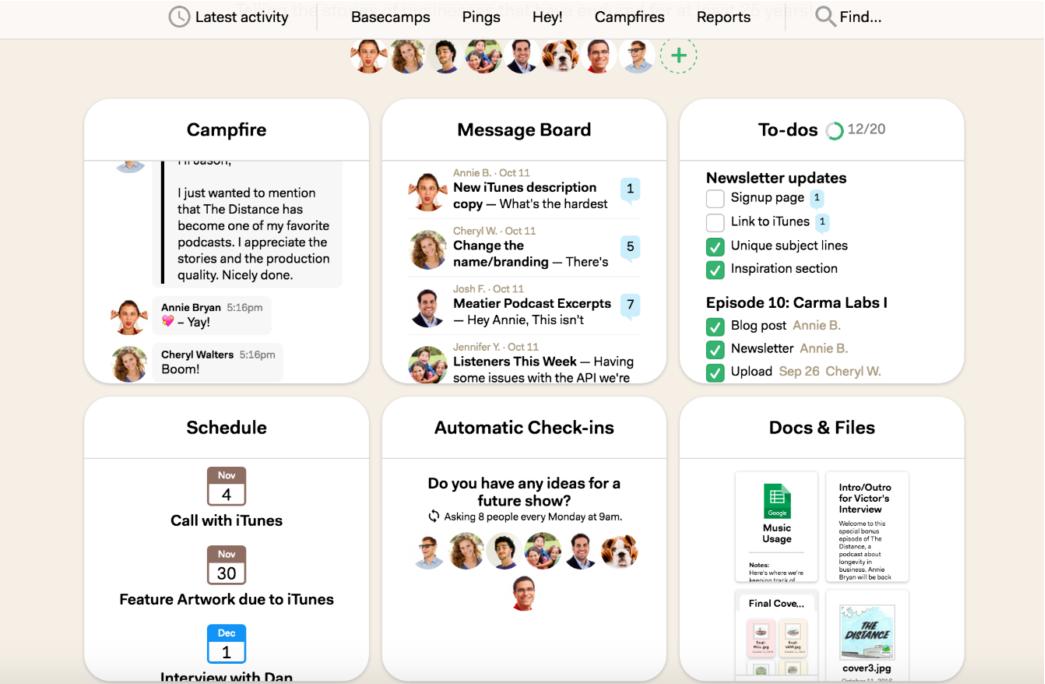
Basecamp is a popular project management tool that is designed to enhance collaboration and streamline project workflows. One of the key features of Basecamp is its all-in-one functionality. The software combines project management, task management, and communication tools into a single platform, making it a convenient solution for teams. Basecamp's user-friendly interface allows users to manage tasks, track progress, and communicate with team members with ease.
Another notable feature of Basecamp is its robust file management capabilities. The software allows users to upload and share files, ensuring that team members have access to the most up-to-date documents. Basecamp's file management features include version control, which ensures that users can track changes and revert to previous versions if necessary. Additionally, Basecamp's integration capabilities, such as with Google Drive and Slack, ensure that teams can work seamlessly across different platforms.
Basecamp also offers comprehensive reporting and analytics features. Managers can generate detailed reports on project progress, task completion, and team performance. These reports provide valuable insights that can be used to make informed decisions and optimize project workflows. Additionally, Basecamp's collaboration tools, such as comments and notifications, ensure that team members can work together effectively. Overall, Basecamp is a powerful project management tool that offers a range of features to enhance collaboration and streamline project workflows.
Asana
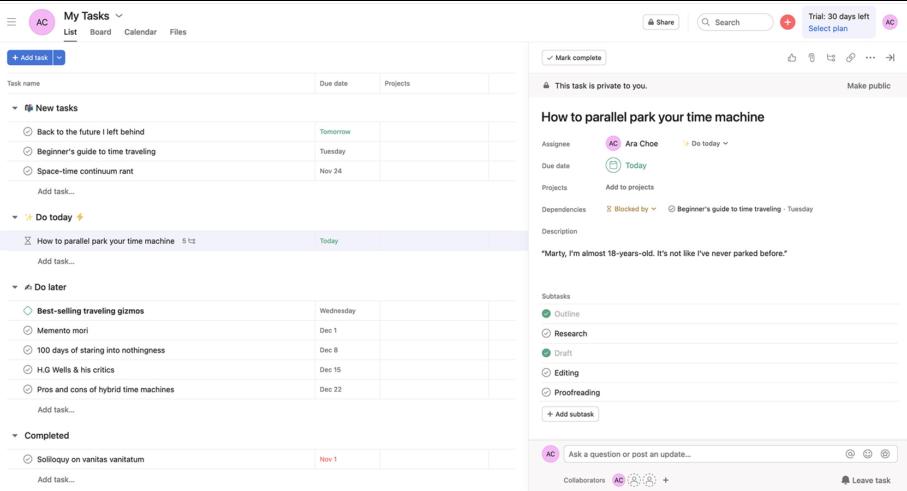
Asana is a widely-used project management tool that is designed to enhance productivity and collaboration. One of the key features of Asana is its intuitive task management capabilities. The software allows users to create and manage tasks with ease, ensuring that team members can quickly identify their priorities. Asana's drag-and-drop functionality makes it easy to organize tasks into different categories, enhancing visibility and organization.
Another notable feature of Asana is its robust reporting and analytics capabilities. The software provides detailed insights into project progress, task completion, and team performance. These insights enable managers to identify potential risks and opportunities, and make informed decisions to optimize project outcomes. Asana's ability to integrate with other tools, such as Slack and Google Drive, ensures that teams can work seamlessly across different platforms.
Asana also offers comprehensive collaboration tools, such as comments, notifications, and file sharing. These tools ensure that team members can work together effectively and stay informed about project progress. Additionally, Asana's mobile app allows users to manage tasks and collaborate on projects from anywhere, making it a convenient solution for remote teams. Overall, Asana is a powerful project management tool that offers a range of features to enhance productivity and collaboration.
nTask
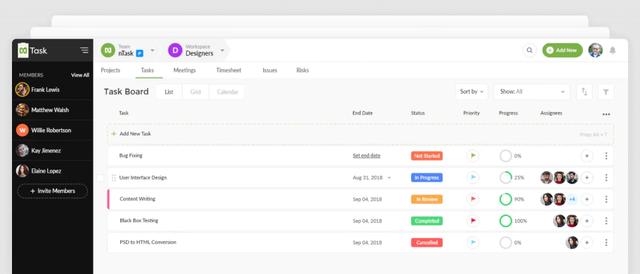
nTask is a comprehensive project management tool that is designed to streamline workflows and enhance collaboration. One of the key features of nTask is its robust task management capabilities. The software allows users to create and manage tasks with ease, ensuring that team members can quickly identify their priorities. nTask's drag-and-drop functionality makes it easy to organize tasks into different categories, enhancing visibility and organization.
Another notable feature of nTask is its robust reporting and analytics capabilities. The software provides detailed insights into project progress, task completion, and team performance. These insights enable managers to identify potential risks and opportunities, and make informed decisions to optimize project outcomes. nTask's ability to integrate with other tools, such as Slack and Google Drive, ensures that teams can work seamlessly across different platforms.
nTask also offers comprehensive collaboration tools, such as comments, notifications, and file sharing. These tools ensure that team members can work together effectively and stay informed about project progress. Additionally, nTask's mobile app allows users to manage tasks and collaborate on projects from anywhere, making it a convenient solution for remote teams. Overall, nTask is a powerful project management tool that offers a range of features to streamline workflows and enhance collaboration.
Conclusion
In conclusion, the ten project management software tools discussed in this article offer a range of features to address the diverse needs of organizations across multiple industries. Whether you are looking for a tool to manage complex projects, streamline workflows, or enhance collaboration, there is a solution that fits your specific requirements. Each software has its unique strengths, and choosing the right one depends on your organization's needs and priorities. By leveraging these powerful tools, organizations can enhance productivity, optimize resource utilization, and ensure project success.
FAQ
1.What factors should I consider when choosing a project management software?
When choosing a project management software, consider factors such as the size and complexity of your projects, the specific features you need (e.g., task management, resource allocation, reporting), integration capabilities with other tools, and the ease of use for your team members. Additionally, consider the software's scalability and whether it can grow with your organization.
2.Can project management software be used for remote teams?
Yes, many project management software tools, such as Asana, Basecamp, and nTask, offer robust collaboration features and mobile apps, making them ideal for remote teams. These tools ensure that team members can manage tasks, communicate, and collaborate effectively from anywhere.
3.How can project management software improve project outcomes?
Project management software can improve project outcomes by enhancing visibility, streamlining workflows, and providing detailed insights into project progress and resource utilization. These tools enable managers to make informed decisions, identify potential risks, and optimize project performance, ultimately leading to successful project outcomes.
ARTICLE TITLE :10 general project management software tools recommended for multiple industries ,AUTHOR :ITpmlib

